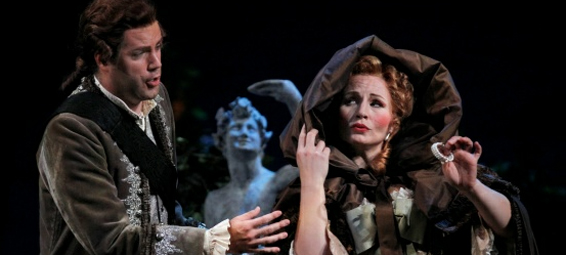Class warfare and the battle of sexes broke out in Fort Worth Saturday night—at least onstage at Bass Performance Hall, where the Fort Worth Opera’s production of Mozart’s The Marriage of Figaro held up to the audience a cold, clear mirror of human folly.
Dissatisfaction was already smoldering across Europe when Pierre Beaumarchais wrote his play Le Mariage de Figaro, a not-so-thinly-veiled attack on the aristocracy, in 1781. Mozart and his librettist, Lorenzo da Ponte, clearly sensed the inevitable fall of the eighteenth-century social order when they borrowed Beaumarchais’ lust-driven, folly-prone characters for their opera in 1786—less than a decade before the storm of revolution would send crowns toppling and hierarchies crumbling across Europe.
One is tempted to speculate that in this production, director Eric Einhorn has been pushed the setting up to, say, 1791 or 1792, and that the news of barricades and guillotines has somehow slipped through to this idyllic, isolated world. The servants seem coolly aware that the game is almost up for their aristocratic masters. Although there’s a clear sense of social disorder embedded in the text, Einhorn subtly takes that element up a level with body language and a tightening of space between the singers. His peasants and servants are delightfully cynical and at times nearly insolent. At one point, Figaro, played with equal parts swagger and befuddlement by bass-baritone Donovan Singletary, proves himself capable of facing down his aristocratic boss, Count Almaviva (baritone Jonathan Beyer).
Einhorn’s staging is likewise unfailingly energetic, frequently ever-so-slightly bawdy, and full of delicious but never overdone sight gags performed by an extraordinarily attractive cast. Michael Wingfield’s, designed for Saratoga Opera, though unremarkable in themselves, were an ideal unobtrusive backdrop for Einhorn’s complex staging.
Musically, Saturday’s performance came across as one of those moments in which a group of outstanding singers devote themselves to creating an ensemble performance and, as a result, emerge with even greater individual glory. Beyer as Almaviva and Singletary as Figaro both own a beauty of tone quality rare in lower voices. Soprano Jan Cornelius sang the two great lament arias (“Porgi, amor” and “Dove sono”) with heart-breaking sweetness. Mezzo-soprano Wallis Giunta was physically lithe and vocally magnificent as Cherubino, the girl-crazy adolescent boy who disguises as a girl. Still, wonderful as the rest of the cast was, soprano Andrea Carroll deservedly won the applause-o-meter as Susanna, having opened the show (and set the tone for the subsequent hijinks) on all fours with her rear facing the audience.
The Fort Worth Symphony and conductor Stewart Robinson constantly interwove Mozart’s flowing of lines and expressive colors, contributing to the aura of humanity and immediacy that kept the audience laughing out loud at this immortal comedy of manners.
Photo by Ron T. Ennis






